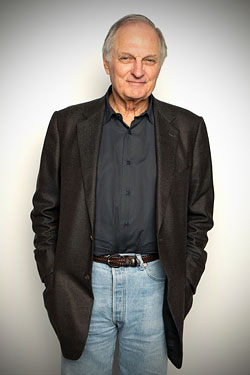
Alan Alda’s storied career has included many decidedly nerdy roles — most recently as kidney-needing professor Milton Green on 30 Rock — and he’ll get a chance to show his inner geek this week at the World Science Festival, kicking off in New York today, which he’s co-chairing. If the idea of Hawkeye hanging with scientists still seems strange, Alda reminded us that he has also, for the past decade, hosted the award-winning PBS series Scientific American Frontiers. Alda spoke to Vulture about his amateur inventions, M*A*S*H-related surgical knowledge, and several fun facts about insects.
Will you be participating in the science festival itself?
Well I’ve been interested in science for a long time. I’ll be taking part in the events; I think there are three, or is it four? I think it’s three that I’ll be interviewing scientists, and that’s fun for me. I’ve done that for eleven years on the Scientific American Frontiers show on PBS. As a matter of fact, I must have interviewed 600 or 700 scientists all around the world.
So were you a big science student growing up?
You know, I never studied science formally. But when I was a kid, I was an amateur inventor. I invented a Lazy Susan for a refrigerator. Not too dumb, right? Except some company on their own invented the same thing a couple years later and made them for a while. Then they stopped making them, I think because ketchup was flying all over kitchens across America. Swing a Lazy Susan hard enough, and it’s not what you’d expect.
You’ve been involved with many medically related shows in your life, from M*A*S*H to ER. Have you noticed changes in what’s asked of actors, knowledge-wise?
I think when you’re acting, you usually don’t have to know too much beyond how to pronounce the words you’re saying [laughs]. But I really had to work hard when I did the play QED on the stage. It was a play about the great physicist Richard Feynman, and I had to go to Caltech and interview a lot of people who both knew Feynman and understood his work, so I could really understand the physics. It was just wonderful to have a picture in my head of gluon tubes! And I wouldn’t have had it otherwise!
You’ve probably encountered some pretty interesting characters…
Well, the dedication of certain scientists is just amazing. I talked to a woman who is an expert on a certain kind of spider. And she had slept on a lava bed every night for seven years so she could be there in the morning when the spiders woke up.
I heard you once knew exactly what procedure a surgeon was doing on you, because it was something you’d performed on M*A*S*H … is that right?
Well, yeah, I was in Chile and I needed an emergency operation in the middle of the night. I was a couple hours away from dying, with an obstructed intestine. And the doctor said, “We’re gonna cut out the bad part of your intestine and sew the two good ends together.” And I said, “Oh you’re gonna do an end-to-end enestymosis?” He said, “How do you know that?!” And I said, “Oh, I did many of them on M*A*S*H.” And I did! It was the first operation I learned about. It was sort of weird to be having it done on me. And he’d watched M*A*S*H in high school … all in a little town in the middle of Chile.
Anything else you’ve learned on set come in handy in real life?
Not too much, ‘cause it’s all been in the operating room. Though I had to do some research on Alzheimer’s, ‘cause I had to play a guy who had that on ER. So now I know all the warning signs, which can drive you crazy. You shouldn’t know all the warning signs — you think you have them!
Harrison Ford and Glenn Close are also involved with the festival. Among the three of you, who’s the biggest science nerd?
I don’t know Harrison, though I do know he’s a big fan of [biologist] E.O. Wilson’s. And Glenn is married to someone who owns a scientific company. So I don’t know what everybody’s interest is, but I do know I’m pretty geeky about it.
Have you ever considered getting back into inventing?
Well, I invented something that we tested out on-camera on Scientific American Frontiers. It was a device I had figured out to eliminate red-eye, if you attached it to any camera. So we made it, and it worked. I was really excited. It’s the first time one of my inventions was tested and worked! I gave it to posterity, though.
E.O. Wilson, champion of the insect, is being honored at the festival this year. Please share with us a fun fact about bugs.
Well one thing I’d like to ask him about is an ant. He’s the world’s greatest expert on ants, and I read maybe twenty years ago about a species of ant that depends on slave ants to eat. It has mandibles shaped like spears, so it can be a good combatant, but it can’t eat because it keeps poking itself in the face, so it needs slaves to feed it. I think that’s a fascinating development! So I want to know if that’s accurate and how they got that way. Isn’t that a curious development in evolution? A species that can’t live without slaves? Sounds like humans.




